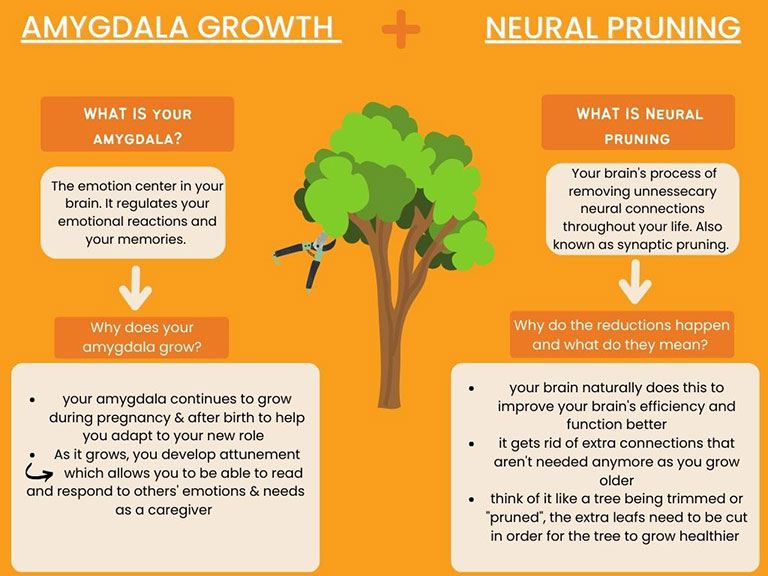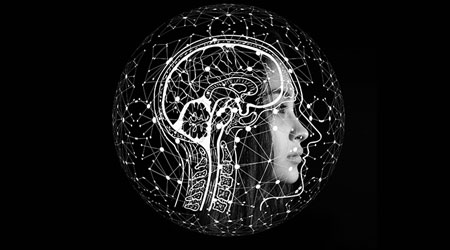Last Spring I was fortunate to have two High Tech High Mesa student interns helping me research and develop social media content. Below is one of two articles written by Alissa Flores, now a high school senior. For this article, Alissa examined recent scientific research on motherhood and cognitive changes happening in the brain.
The Science Behind ‘Mommy Brain’
By Contributing Writer Alissa Flores, Intern
Is mommy brain real? Up to 80% of new mothers experience this distracted feeling and brain fog post-partum (Washington Post, 2021). But why? New research suggests that women’s brains are wired to adapt to the role of motherhood. First-time mothers experience changes in their brain during pregnancy and post-partum. Also during pregnancy, hormones such as progesterone and estrogen, rise. But, the high rise of hormones, especially estrogen, along with stress and anxiety brought by motherhood can also cause what has been referred to as “mommy brain” in popular culture.
What changes are happening?
A 2016 study found that first-time mothers experienced reductions in gray brain matter in regions responsible for social cognition that lasted up to 2 years. Mothers were scanned pre-pregnancy and again after birth. When the scans were compared to non-mothers, the matter loss was seen only in the mothers. Men’s brains have also been observed and it was seen they only adapt when deeply involved in caring for a child. (Washington Post,2021). The gray matter in the brain takes part in the process of important functions such as processing emotions, hearing, seeing, and making decisions. This reduction is known as synaptic pruning which is a natural process. As you evolve in life, this process happens in your brain to eliminate extra neural connections thus improving brain efficacy. As an illustration, think of it as a bush being “pruned” so it can regrow better. Your body releases more hormones like progesterone to prepare your uterus and body to carry a baby. Estrogen helps your body develop your baby. However, the fluctuation of hormones make you more prone to mood swings and anxiety.

How does this benefit me?
Your brain changing during pregnancy can sound like a scary thing at first, but your body does this to allow you to better respond to the cues and needs of an infant post-partum. As pruning takes place, other areas of the brain experience new growth. Your amygdala grows during pregnancy and postpartum; this area has many receptors for hormones like oxytocin. Oxytocin levels flourish in women during pregnancy and postpartum; higher levels of the hormone oxytocin have been connected to highly involved mothers. The amount of oxytocin flowing to the amygdala correlates with high amygdala activation.
The loss in gray brain matter previously mentioned also occurred in the hippocampus (brain’s memory control). As a mother, your focus goes towards the part of the brain that’s responsible for figuring out your infant’s wants and needs. Synaptic pruning causes the decreases to happen, which according to researcher Elseline Hoekzema, is a process that “eliminates certain connections between brain cells to encourage the facilitation of new connections” (NY Times,2020). These changes could be beneficial to you in motherhood as the process can aid in the brain’s focus on certain actions and activities.
Researchers claim that the changes can be an advantage throughout not only motherhood, but when taking on caregiving responsibilities later in life, as they don’t immediately disappear. Abigail Tucker, the author of Mom Genes: Inside the New Science of Our Ancient Maternal Instinct, says “The cognitive advantages [new moms] have are something like a super power” and “Brain shrinkage sounds sad and depressing… [but it] might not actually mean these brain parts are getting worse”. Expecting and new mothers are able to differentiate more details ranging from minute color differences to their babies’ distinctive cries. These changes allow your brain to distinguish minute details. Another study, done by Valeria Tucker Miller at Purdue University, discovered that mothers’ reaction times were often better than those of other women. As these studies show, these brain changes have an adaptive quality.
How are they linked to postpartum issues?
Approximately one in six women will suffer from postpartum depression and other issues that develop after giving birth (The Atlantic,2015). Some experts believe the brain changes might contribute to postpartum depression and anxiety. New mothers experience growth in brain areas that are responsible for regulation of emotions and empathy. Researcher Pilyoung Kim believes that this is what causes new mothers to develop obsessive-compulsive behaviors: “Mothers actually report very high levels of patterns of thinking about things that they cannot control”; this stems from the urgency and desire to take great care of your child. Have you found yourself obsessing over whether your baby is safe and sound? Your amygdala after giving birth continues to grow and is “correlated with how a new mother behaves—an enhanced amygdala makes her hypersensitive to her baby’s needs” (The Atlantic,2015). Other researchers like Dr.Simone Vigod, believe synaptic pruning and brain alteration are connected to postpartum depression and anxiety (NY Times,2020). Unfortunately, your brain attempting to prepare you to be a better mom can be the cause of your constant feeling of sadness and disconnection to your baby. Postpartum depression and negative moods after birth are not your fault, it’s just human nature.
Conclusion
The pregnant and postpartum brain go through neural changes which can cause mommy brain but this also sets up our brains to allow us to be caring and careful mothers. The drastic changes that happen are so much more than just dealing with forgetfulness, our brains are designed to be mothers but things like postpartum depression can cause difficulty. Yale researchers say that studying and learning more about the postpartum brain will reveal why the maternal brain is developed this way and help with getting rid of the overwhelming stigma centered around postpartum illness (Greater Good,2008). As a result, more mothers will break their silence about their experiences and seek help. To reiterate, research shows that 85% of new moms endure a “passing period of sadness or irritability” (Greater Good,2008). Too many women are experiencing this for there not to be more research available. It is necessary for more studies to be done so more women will understand their behaviors more and we can work on treating them. Our brains function the way they do for a reason. It is not 100% clear why new mothers experience melancholy but always remember that you are not alone. It can feel like these struggles are unnatural, that nobody else will understand or that something is wrong with you, but this shouldn’t be and isn’t your reality. There are several ways to alleviate this shame and stress: psychotherapy and various support groups are available to help. Reaching out to friends and family for assistance allows you to prevent sleep deprivation, which is essential for relieving symptoms of postpartum illness. Therapeutic strategies and medication have been found to help and transform mothers cope with their postpartum depression. This isn’t a helpless battle, many other women are going through the same thing.
San Diego Professionals & Crisis Number :
https://postpartumhealthalliance.org
Local Postpartum Groups:
https://www.sharp.com/health-classes/postpartum-support-group—sharp-mary-birch-hospital-for-women–newborns-17
Hotline Number & Specialized Help:
https://www.postpartum.net/get-help/locations/
Further reading on Postpartum Depression: https://familydoctor.org/condition/postpartum-depression/
https://www.womenshealth.gov/mental-health/mental-health-conditions/postpartum-depression

